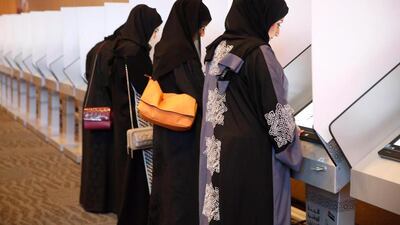ABU DHABI // The number of people eligible to vote or stand in Federal National Council elections has been steadily increasing since elections were first held in 2006.
While the trend seemed to suggest that all Emiratis would be able to vote in the future, the matter was still unclear, according to Tariq Lootah, undersecretary for the Ministry of State for FNC Affairs and head of the Elections Management Committee.
In 2006, 6,689 people were given the franchise or to stand for a position across the emirates.
In 2011, that number rose to 135,308, and last year the size of the electoral college increased by 66 per cent, and constituted 224,279 electors.
How the election process would evolve from now on was “unpredictable”, Mr Lootah said.
“If I could speculate how much it will increase, I will build my speculations on history. We started with 6,689 ... to 224,279, so the percentage is unpredictable.”
He said the colleges were decided by the Rulers’ courts.
“I expect it to develop and not to shrink, but I don’t have a certain piece of information to build on.”
As for how much longer it will take to include everyone over the age of 21, he said: “This is based on authoritative decisions. All I can say is that 10 years have passed since we began Tamkeen [an initiative to gradually increase political participation, introduced in 2005] and the gradual increase was clear.
“Unfortunately some people are in a hurry, they want to transfer other models here, but every country implements what is suitable for it. We are a country with a special case.”
He said that the gradual inclusion of voters was necessary.
“The country was founded 46 years ago on a certain system. When it changes, that system will effect an entire society.”
Hessa Al Kitbi, 31, a voter last year, agreed.
“If we opened the elections and made it unlimited, without restrictions, we are only creating chaos and parties – taking the Kuwaiti experience as an example.
“We are not in need of such an experience. This is the most right and fairest way. We are trying to give the chance to everyone to participate, by turn, over the cycles.”
She did not believe electors were chosen based on certain criteria.
“My name was randomly selected, [like] many other locals coming from all social classes and tribes. I was not selected in the past cycle but this time I was. It was important for me to vote because it is my duty to participate when my country gives me the chance to.
“I do not know if I will be lucky next time to get the chance to vote and elect, but I surely will if my name comes up,” she said.
Salem Al Shehhi, a winner for Ras Al Khaimah’s in the previous elections, did not sense a shortage in the number of selected voters from his emirate.
“It was enough and covered large numbers,” he said.
In fact, he did not have to advertise or “pay a single dirham for social media campaigns, not a brochure or a campaign tent” to introduce himself to electors.
“I only announced I was running, and people started campaigning for me and posting photos across social media and so on.”
Mr Al Shehhi received 2,037 votes, 700 more than the second-placed candidate.
Zeina Ali, a 32-year-old businesswoman, who has not been selected yet, agreed with the gradual expansion. However, she feels that “not anyone should be able to run for elections”. She said: “If I were in the electoral college, I would not have been a candidate, but yes, I would have voted. It is important for me to participate.”
hdajani@thenational.ae


